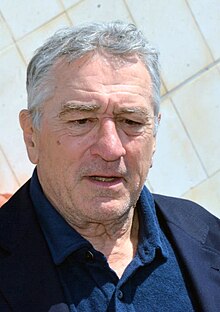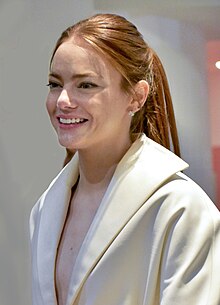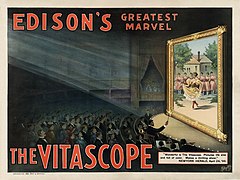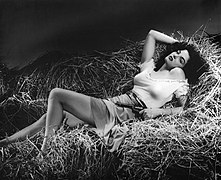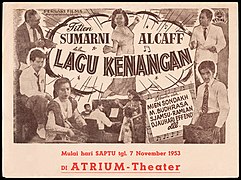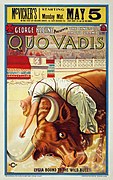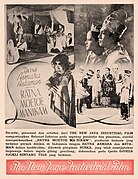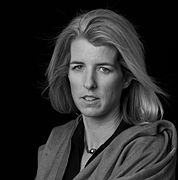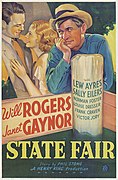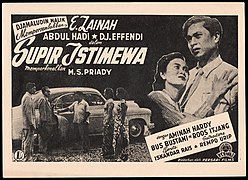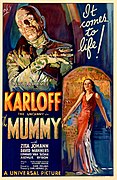Portal:Film
Wikipedia portal for content related to Film / From Wikipedia, the free encyclopedia
Portal maintenance status: (June 2018)
|
The Film Portal
 A film (British English) – also called a movie (American English), motion picture, moving picture, picture, photoplay or (slang) flick – is a work of visual art that simulates experiences and otherwise communicates ideas, stories, perceptions, feelings, beauty, or atmosphere through the use of moving images. These images are generally accompanied by sound and, more rarely, other sensory stimulations. The word "cinema", short for cinematography, is often used to refer to filmmaking and the film industry, and the art form that is the result of it. (Full article...)
A film (British English) – also called a movie (American English), motion picture, moving picture, picture, photoplay or (slang) flick – is a work of visual art that simulates experiences and otherwise communicates ideas, stories, perceptions, feelings, beauty, or atmosphere through the use of moving images. These images are generally accompanied by sound and, more rarely, other sensory stimulations. The word "cinema", short for cinematography, is often used to refer to filmmaking and the film industry, and the art form that is the result of it. (Full article...)
Featured articles - load new batch
Saturday Night Fever is a 1977 American dance drama film directed by John Badham and produced by Robert Stigwood. It stars John Travolta as Tony Manero, a young Italian-American man who spends his weekends dancing and drinking at a local discothèque while dealing with social tensions and disillusionment in his working class ethnic neighborhood in Brooklyn. The story is based on "Tribal Rites of the New Saturday Night", a mostly fictional 1976 article by music writer Nik Cohn.
A major critical and commercial success, Saturday Night Fever had a tremendous impact on the popular culture of the late 1970s. It helped popularize disco around the world and initiated a series of collaborations between film studios and record labels. It made Travolta, already well known from his role in the popular TV sitcom Welcome Back, Kotter, a household name. He was nominated for the Academy Award for Best Actor for his performance, at the time becoming the fourth-youngest nominee in the category. The film showcases aspects of the music, dancing, and subculture surrounding the disco era, including symphony-orchestrated melodies, haute couture styles of clothing, pre-AIDS sexual promiscuity, and graceful choreography. The Saturday Night Fever soundtrack, featuring songs by the Bee Gees, is one of the best-selling soundtrack albums worldwide. Travolta reprised his role of Tony Manero in Staying Alive in 1983, which was panned by critics despite being successful at the box office. (Portal:Film/Featured content)
General images - load new batch
- Image 2The Babelsberg Studio near Berlin was the first large-scale film studio in the world (founded 1912) and the forerunner to Hollywood. It still produces global blockbusters every year. (from Film industry)
- Image 3The Jazz Singer (1927), was the first full-length film with synchronized sound. (from History of film technology)
- Image 4A production scene from the 1950 Hollywood film Julius Caesar starring Charlton Heston (from History of film)
- Image 6Cinema admissions in 1995 (from History of film)
- Image 11Oskar Messter (from History of film)
- Image 12Flying pelican captured by Marey around 1882. He created a method of recording several phases of movement superimposed into one photograph (from History of film technology)
- Image 13Original script from the 1989 film Batman (from History of film)
- Image 16Off Plus Camera Film Festival in Kraków, 2012, with Andrzej Seweryn, Daniel Olbrychski, and Wojciech Pszoniak on stage. (from Film industry)
- Image 17The first two shots of As Seen Through a Telescope (1900), with the telescope POV simulated by the circular mask (from History of film)
- Image 18Don Juan is the first feature-length film to use the Vitaphone sound-on-disc sound system with a synchronized musical score and sound effects, though it has no spoken dialogue. (from History of film)
- Image 19An electrotachyscope(from History of film technology)
American Scientific, 16/11/1889, p. 303 - Image 21William Friese-Greene (from Film industry)
- Image 23A scene from Raja Harishchandra (1913) – credited as the first full-length Indian motion picture. (from Film industry)
- Image 27A.E. Smith filming The Bargain Fiend in the Vitagraph Studios in 1907. Arc floodlights hang overhead. (from History of film)
- Image 30Max Skladanowsky (right) in 1934 with his brother Eugen and the Bioscop (from History of film technology)
- Image 31Louis Poyet [fr]'s engraving of the mechanism of the "fusil photographique" as published in La Nature (april 1882) (from History of film technology)
- Image 33Czermak's 1855 Stereophoroskop (from History of film technology)
- Image 34Nestor studio, 1911 (from Film industry)
- Image 36London IMAX has the largest cinema screen in Britain with a total screen size of 520 m2. (from Film industry)
- Image 37A surviving two-color-component image from the first Technicolor feature film, The Gulf Between (1917) (from History of film technology)
- Image 38Poster for the 1956 Egyptian film Wakeful Eyes starring Salah Zulfikar and Shadia (from History of film)
- Image 39The Babelsberg Studio near Berlin, the earliest large-scale film studio complex (founded 1912) Today its one of the major film studios worldwide. (from History of film)
- Image 40Animated GIF of Prof. Stampfer's Stroboscopische Scheibe No. X (Trentsensky & Vieweg 1833) (from History of film technology)
- Image 41Discounted DVD home video film releases sold in the Netherlands (from Film industry)
- Image 42Italian neorealist movie Bicycle Thieves (1948) by Vittorio De Sica, considered part of the canon of classic cinema (from History of film)
- Image 43GIF animation from retouched pictures of The Horse in Motion by Eadweard Muybridge (1879). (from History of film technology)
- Image 44A frame from the Lumière brothers staged comedy film, L'Arroseur Arrosé (1895) (from History of film)
Selected image
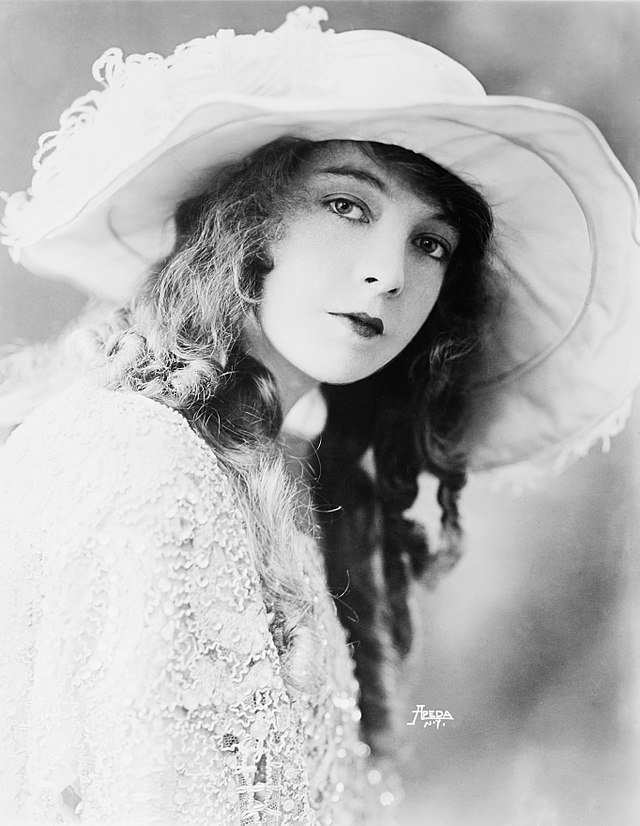
| Credit: Bain News Service |
Lillian Diana Gish (October 14, 1893 – February 27, 1993), was an American stage, screen and television actress whose film acting career spanned 75 years, from 1912 to 1987. She was a prominent film star of the 1910s and 1920s, particularly associated with the films of director D. W. Griffith, including her leading role in Griffith's seminal Birth of a Nation (1915).
Did you know...
- ... that the 1994 film The Devil Never Sleeps centers on director Lourdes Portillo investigating her uncle's death?
- ... that Egghead & Twinkie claims to be the first feature film crowdsourced on TikTok?
- ... that the studios of Basin PBS had once been a movie theater, a church meeting space, and a nightclub?
- ... that in a segment filmed for The Late Report, comedian John Safran got frisked by police after going to a McDonald's restaurant dressed up as Ronald McDonald?
- ... that the actor Andrew Still worked as a receptionist and janitor after leaving Hollyoaks?
Selected biography - show another
Robert Anthony De Niro (/də ˈnɪəroʊ/ də NEER-roh, Italian: [de ˈniːro]; born August 17, 1943) is an American actor and film producer. Known for his collaborations with Martin Scorsese, he is considered to be one of the greatest and most influential actors of his generation. De Niro is the recipient of various accolades, including two Academy Awards, a Golden Globe Award, the Cecil B. DeMille Award, and a Screen Actors Guild Life Achievement Award. He received the Kennedy Center Honors in 2009, and the Presidential Medal of Freedom from U.S. President Barack Obama in 2016.
De Niro studied acting at HB Studio, Stella Adler Conservatory, and Lee Strasberg's Actors Studio. His first credit screen role was in Brian de Palma's Greetings (1968). De Niro's first collaboration with Scorsese was with the crime drama film Mean Streets (1973). De Niro earned two Academy Awards, one for Best Supporting Actor for his role as Vito Corleone in Francis Ford Coppola's The Godfather Part II (1974) and the other for Best Actor portraying Jake LaMotta in Scorsese's drama Raging Bull (1980). De Niro was Oscar-nominated for his performances in Taxi Driver (1976), The Deer Hunter (1978), Awakenings (1990), Cape Fear (1991), Silver Linings Playbook (2012), and Killers of the Flower Moon (2023). (Full article...)Featured lists - load new batch
- Image 1Zindagi Na Milegi Dobara (English: You Live Only Once) is a 2011 Indian coming-of-age film directed by Zoya Akhtar, who also co-wrote the film along with Reema Kagti. It is produced by Excel Entertainment. The film stars an ensemble cast of Hrithik Roshan, Abhay Deol and Farhan Akhtar, with Katrina Kaif and Kalki Koechlin in supporting roles. The musical score for the film was composed by the trio Shankar–Ehsaan–Loy. Its cinematography was provided by Carlos Catalan. The film narrates the story of three friends on a bachelor trip and how each of them discover themselves and overcome their problems and insecurities.
Made on a budget of ₹550 million (US$6.6 million), Zindagi Na Milegi Dobara was released on 5 July 2011 and grossed over ₹1.53 billion (US$18 million) worldwide. Rotten Tomatoes, a review aggregator, surveyed 7 reviews and judged 100 percent to be positive. The film garnered awards and nominations in several categories, with particular praise for its direction, screenplay, and the performances of its cast. As of 2015, the film has won 33 awards from 66 nominations. (Full article...) - Image 2
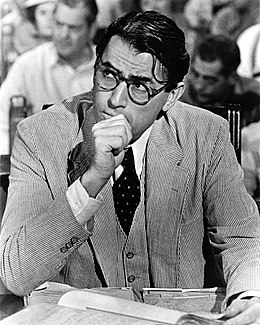
Peck as Atticus Finch in a publicity photo for To Kill a Mockingbird (1962)
Gregory Peck (1916–2003) was an American actor who had an extensive career in film, television, radio, and on stage. Peck's breakthrough role was as a Catholic priest who attempts to start a mission in China in the 1944 film The Keys of the Kingdom, for which he received his first nomination for the Academy Award for Best Actor. In the same year, he played Count Vronsky in a radio adaptation of Leo Tolstoy's Anna Karenina. He followed this by starring in Alfred Hitchcock's psychological thriller Spellbound (1945) with Ingrid Bergman. In the late 1940s, Peck received three more nominations for the Academy Award for Best Actor for his roles as a caring father in The Yearling (1946), a journalist who pretends to be Jewish to write an exposé on American antisemitism in Gentleman's Agreement (1947), and a brave airman in Twelve O'Clock High (1949).
Peck co-founded the theatre company La Jolla Playhouse in 1947 with Dorothy McGuire and Mel Ferrer. He starred in productions of Angel Street and The Male Animal for the company. In 1951, he played Royal Navy officer Horatio Hornblower in the eponymous film, David in the biblical epic David and Bathsheba with Susan Hayward, and a soldier in the western Only the Valiant with Barbara Payton. Two years later, Peck appeared as a journalist who falls in love with a princess in the romantic comedy Roman Holiday (1953) with Audrey Hepburn. During the late 1950s, he portrayed Captain Ahab in Moby Dick (1956), war hero Joseph G. Clemons in Pork Chop Hill (1959), and writer F. Scott Fitzgerald in Beloved Infidel (1959). (Full article...) - Image 3The 2023 recipient: Emma Stone
The Academy Award for Best Actress is an award presented annually by the Academy of Motion Picture Arts and Sciences (AMPAS). It has been awarded since the 1st Academy Awards to an actress who has delivered an outstanding performance in a leading role in a film released that year. The award is traditionally presented by the previous year's Best Actor winner.
The Best Actress award has been presented 96 times, to 79 actresses. The first winner was Janet Gaynor for her roles in 7th Heaven, Street Angel, and Sunrise: A Song of Two Humans. The most recent winner is Emma Stone for her role in Poor Things (2023); she had previously won the award for her role in La La Land (2016). The record for most wins is four, held by Katharine Hepburn. Frances McDormand has won three times, and thirteen other actresses have won the award twice. Meryl Streep has received the most nominations in the category—seventeen—and has won twice. At the 41st Academy Awards, Barbra Streisand and Katharine Hepburn received the same number of votes and thus tied for Best Actress (the only time this has occurred). (Full article...) - Image 4The 2023 recipient: Christopher Nolan
The Academy Award for Best Director (officially known as the Academy Award of Merit for Directing) is an award presented annually by the Academy of Motion Picture Arts and Sciences (AMPAS). It is given in honor of a film director who has exhibited outstanding directing while working in the film industry.
The 1st Academy Awards ceremony was held in 1929 with the award being split into "Dramatic" and "Comedy" categories; Frank Borzage and Lewis Milestone won for 7th Heaven and Two Arabian Knights, respectively. However, these categories were merged for all subsequent ceremonies. Nominees are determined by single transferable vote within the directors branch of AMPAS; winners are selected by a plurality vote from the entire eligible voting members of the academy. (Full article...) - Image 5

Beyoncé at the Renaissance World Tour in 2023. Performances from this tour were filmed for the self-directed theatrical release Renaissance: A Film by Beyoncé (2023).
American singer Beyoncé has appeared in numerous music videos, documentaries and films. She has also directed eight full-length films, including five concert films and two musical films. Her films have grossed over $2.5 billion worldwide at the box office. She first appeared in the 1997 music video for Destiny's Child's "No, No, No", after which she made her film debut as the lead in the direct-to-video musical Carmen: A Hip Hopera (2001). Beyoncé's first solo music video was the soundtrack single "Work It Out" for Austin Powers in Goldmember (2002), which also featured her debut theatrical film role. She released her first music video as a solo artist for "Crazy in Love" from Dangerously in Love (2003).
In 2006, Beyoncé starred in two films: The Pink Panther, which spawned the single "Check on It" and its pink-themed video, and the musical drama Dreamgirls, which earned her a Golden Globe Award for Best Actress nomination. Her second solo album B'Day (2006) was her first "visual album" project — music videos for thirteen of the album's songs were released via the B'Day Anthology Video Album. Music videos were also released for singles from I Am... Sasha Fierce (2008); the black-and-white video for "Single Ladies (Put a Ring on It)" inspired a dance craze. Beyoncé ended the decade with the lead role in the thriller film Obsessed (2009). (Full article...) - Image 6The Latin Grammy Award for Best Long Form Music Video is an honor presented annually at the Latin Grammy Awards, a ceremony that recognizes excellence and promotes a wider awareness of cultural diversity and contributions of Latin recording artists in the United States and internationally. According to the category description guide for the 13th Latin Grammy Awards, the award is for video albums consisting of more than one song or track and is awarded to artists, video directors and/or producers of at least 51% of the total playing time. If the work is a tribute or collection of live performances, the award is presented only to the directors or producers.
The accolade for Best Long Form Music Video was first presented at the 7th Latin Grammy Awards in 2006 as a tie between Spanish recording artists Bebo and Cigala for their album Blanco y Negro En Vivo (2005) and Café Tacuba for their live album Un Viaje (2005). Three recipients of the award won with a MTV Unplugged release; Ricky Martin (2006), Julieta Venegas (2007) and Juanes (2012). Mexican singer Natalia Lafourcade holds the record of most wins in the category with three (2013, 2017, 2022). (Full article...) - Image 7Vishwaroopam is a 2013 Indian spy thriller film directed by Kamal Haasan. Besides starring in the lead role with Pooja Kumar, Haasan co-produced the film with S. Chandrahaasan and Prasad V. Potluri, and co-wrote the script with Atul Tiwari. Andrea Jeremiah, Rahul Bose, Shekhar Kapur and Nassar play supporting roles in the film. The film's story revolves around Wisam Ahmed Kashmiri, a spy from India's intelligence agency Research and Analysis Wing, stopping a group of Al-Qaeda terrorists led by Omar (Bose) from triggering a dirty bomb made by scraping caesium from oncological equipment in New York City. A bilingual film, made in Tamil and Hindi (as Vishwaroop), the soundtrack and score were composed by Shankar–Ehsaan–Loy. Sanu Varghese and Mahesh Narayanan were in charge of the film's cinematography and editing respectively. Lalgudi N. Ilaiyaraaja and Boontawee 'Thor' Taweepasas were in charge of art direction while Birju Maharaj handled the choreography.
Vishwaroopam was made on a budget of ₹950 million. The film was released on 25 January 2013 worldwide except Tamil Nadu where it was banned due to protest by Islamic organisations which cited that Muslims were depicted in a negative manner. The ban on the film was lifted and it released on 7 February 2013 after a mutual agreement between Haasan and the organisations; the Hindi version was released on 1 February 2013. Both versions received generally positive reviews and were commercial successes at the box office, collectively grossing ₹2.2 billion overall. (Full article...) - Image 8

Khan at the Marrakech International Film Festival in 2012
Shah Rukh Khan is an Indian actor, film producer, and television personality predominantly known for his work in Bollywood. He is the recipient of several awards, including 15 Filmfare Awards, Screen Awards, Zee Cine Awards, and IIFA Awards. Besides acting awards, he has received a number of state honours, including the Padma Shri by the Government of India in 2005, the Ordre des Arts et des Lettres in 2007, and the Legion of Honour in 2014 (both by the Government of France).
Khan made his acting debut with a leading role in the romantic drama Deewana (1992), which won him the Filmfare Award for Best Male Debut. The next year he won his first Best Actor trophy for his portrayal of a murderer in Baazigar, and a Best Performance in a Negative Role nomination (both at Filmfare) for his performance as an obsessive lover in Darr. Khan's most significant release of the 1990s was Dilwale Dulhania Le Jayenge. He portrayed a non-resident Indian who falls in love with the character played by Kajol, for which he earned another Filmfare Award for Best Actor as well as his first Screen Award. Khan later won two consecutive Filmfare Awards in the Best Actor category for his performances in Dil To Pagal Hai (1997) and Kuch Kuch Hota Hai (1998), both films focusing on a love quadrangle. (Full article...) - Image 9The 70th Academy Awards ceremony, organized by the Academy of Motion Picture Arts and Sciences (AMPAS), took place on March 23, 1998, at the Shrine Auditorium in Los Angeles beginning at 6:00 p.m. PST / 9:00 p.m. EST. During the show, AMPAS presented Academy Awards (commonly referred to as Oscars) in 24 categories honoring films released in 1997. The ceremony, which was televised in the United States by ABC, was produced by Gil Cates and directed by Louis J. Horvitz. Actor Billy Crystal hosted the show for the sixth time. He had first hosted the 62nd ceremony held in 1990, and most recently the previous year's awards. Nearly a month earlier in an event held at the Regent Beverly Wilshire Hotel in Beverly Hills, California on February 28, the Academy Awards for Technical Achievement were presented by host Ashley Judd.
Titanic won 11 awards, including Best Picture, a number that is tied with Ben-Hur and The Lord of the Rings: The Return of the King. Other winners included As Good as It Gets, Good Will Hunting, and L.A. Confidential with two awards, and Character, The Full Monty, Geri's Game, The Long Way Home, Men in Black, A Story of Healing, and Visas and Virtue with one. The telecast garnered more than 57 million viewers in the United States, making it the most-watched Oscars broadcast in history. (Full article...) - Image 10The 95th Academy Awards ceremony, presented by the Academy of Motion Picture Arts and Sciences (AMPAS), took place on March 12, 2023, at the Dolby Theatre in Hollywood, Los Angeles. During the gala, the AMPAS presented Academy Awards (commonly referred to as Oscars) in 23 categories honoring films released in 2022. The ceremony, televised in the United States by ABC, was produced by Glenn Weiss and Ricky Kirshner, with Weiss also serving as director. Comedian Jimmy Kimmel hosted the show for the third time, following the 89th ceremony in 2017 and the 90th ceremony in 2018.
In related events, the Academy held its 13th annual Governors Awards ceremony at the Fairmont Century Plaza Hotel in Century City, California, on November 19, 2022. The Academy Scientific and Technical Awards were presented by host Simu Liu on February 24, 2023, in a ceremony at the Academy Museum of Motion Pictures in Los Angeles. (Full article...)
News
- September 2: Tributes paid to recently deceased US actor Chadwick Boseman
- October 7: Mockumentary Mister America has world premiere
- May 16: Actor Doris Day dies at 97
- January 22: Former U.S. intelligence agent Tony Mendez, architect of 'Argo' rescue, dies at 78
- Upcoming events
WikiProjects
Selected quote
| Anybody can direct. There are only eleven good writers. In all of Hollywood. |
Main topics
- Terms - Animation • Beta movement • Camera • Cult film • Digital cinema • Documentary film • Dubbing • Experimental film • Fan film • Film crew • Film criticism • Film festival • Film frame • Film genre • Film journals and magazines • Film industry • Film manifesto • Film stock • Film theory • Filmmaking • History of film • Independent film • Lost film • Movie star • Narrative film • Open content film • Persistence of vision • Photographic film • Propaganda • Recording medium • Special effect • Subtitles • Sound stage • Web film • World cinema
- Lists - List of basic film topics • List of film topics • List of films • List of film festivals • List of film formats • List of film series • List of film techniques • List of highest-grossing films • List of longest films by running time • List of songs based on a film or book • Lists of film source material • List of open content films
Featured content
Subcategories
Subportals
Related portals
Things you can do
- Add
{{portal|Film}}to the See also section of film-related articles. - Tag the talk pages of film related articles with the {{WikiProject Film}} banner.
- Explore the list of English language films without an article
- Check tasks and announcements at WPFILM Announcements.
- Collaborate with other participants at Wikipedia:WikiProject Film.
- Join one of the task forces at Wikipedia:WikiProject Film/Sidebar.
Associated Wikimedia
The following Wikimedia Foundation sister projects provide more on this subject:
-
Commons
Free media repository -
Wikibooks
Free textbooks and manuals -
Wikidata
Free knowledge base -
Wikinews
Free-content news -
Wikiquote
Collection of quotations -
Wikisource
Free-content library -
Wikiversity
Free learning tools -
Wiktionary
Dictionary and thesaurus
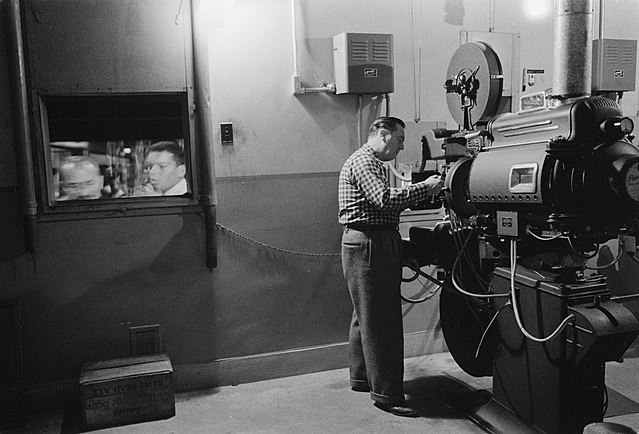





























![Image 31Louis Poyet [fr]'s engraving of the mechanism of the "fusil photographique" as published in La Nature (april 1882) (from History of film technology)](http://upload.wikimedia.org/wikipedia/commons/thumb/f/f0/Fusil_photographique_Marey2.png/120px-Fusil_photographique_Marey2.png)













